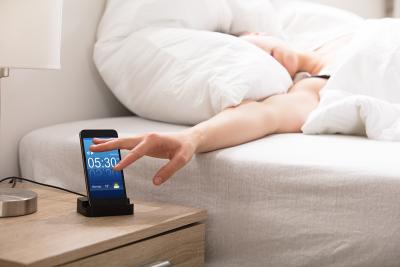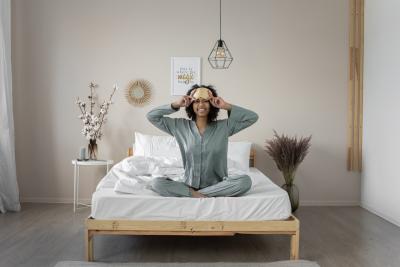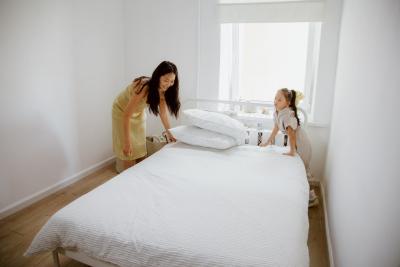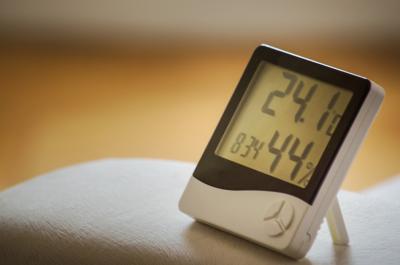British summertime is one of the best times of the year, especially when we enjoy the beautiful sunshine in our gardens, parks or beaches! But with plentiful sunshine comes a greater problem - trying to sleep when it's hot.
As lovely as summer is in the UK, it inevitably leads to increased levels of humidity that can often make life unbearable - especially in our heavily insulated homes! This, in turn, can lead to many of us struggling to sleep during overly hot and sweaty nights.
It's a problem that comes around every year without fail, so we’re taking a look at why heat and humidity can impact our sleep, along with some tips on how to get to sleep during hot weather and cool your room down.

How does humidity impact your sleep?
Believe it or not, a certain amount of humidity is good for you. Humidity is how damp the air is or how much water vapour is in the air, and the higher the humidity levels, the more water is present. The US Environmental Protection Agency states that the ideal indoor humidity level should be 30-50% and ideally below 60%.
Humidity levels above 60% can lead to mildew and mould in a home, which can cause breathing issues. On the other hand, if it's too low, it can also cause other health issues, such as dry skin and damage to your home, as the wood shrinks due to a lack of moisture. High humidity levels prevent the body’s natural moisture from evaporating, leading to that sticky and sweaty feeling that keeps you up at night. It can also leave you feeling congested, stuffy and pretty rotten overall.
As mentioned before, mould and dust mites also love humidity's added moisture. Mould will grow, and dust mites will thrive, so if you have any allergies or generally find the idea of mites crawling around your bed repulsive, you may want to find a quick solution.

How to cool down your room
If you’re finding all this humidity just a bit too much, thankfully, you can do a few things to increase your chances of getting a bit of shut-eye.
1. Natural bedding for a cooler sleep
Natural bedding is the way forward if you're looking for a quick way to sleep cooler at night! Whether you choose cotton, linen, bamboo, or silk, all these natural bedding types have temperature-regulating properties and offer varying levels of breathability to help keep you comfortable at night. An added benefit is that it can be a quick and cheap way to cool yourself down!
2. Light-coloured bedding to reflect light
This one's all about basic physics - think back to your high school lessons and remember all about colour and how it interacts with light (or heat). Darker-coloured sheets absorb light, making them more likely to become hotter, whereas lighter sheets, especially white, reflect light away! There's a reason that houses in hotter places are often white! This can also work in the bedroom - lightly coloured sheets will help your attempts at shut-eye by reducing the risk of absorbing sunlight and heat.
3. Eat less before bedtime
Hot weather can make you less likely to want to eat anyway, but we recommend that you shouldn't eat at least an hour or two before you go to bed. Eating can make you feel tired, something we've all experienced, but it can also make you feel hot and uncomfortable, as digesting food creates heat! You don't want this if you're struggling with a hot bedroom!
4. Avoid drinking alcohol or caffeine
We're not saying you can't have any of this when the weather is hot and humid, but having it before bed is not advisable! As many people will know, caffeine is a stimulant with effects lasting up to six hours, such as causing your blood pressure to rise along with your body temperature. Alcohol is a diuretic, so you often need to use the toilet more if you drink. In turn, it can also make you sweat more, which, combined with going to the toilet, can lead to dehydration. If you're feeling thirsty during hot weather, we'd recommend drinking just water instead of caffeine or alcohol - it not only keeps you feeling refreshed and healthy but will replenish all the water you're losing by sweating.
5. Buy blackout curtains
As their name suggests, blackout curtains are designed to 'black out' a room. This means that they'll keep a room dark when fully closed, even if the sun is shining directly in. But another benefit is that they're great at keeping the heat in during winter and out during the summer. Invest in blackout curtains for your bedroom and keep them closed during the day when the weather is warm. Then, open them back at night to let in the cooler air!
6. Get yourself a cooling mattress
Mattresses nowadays are all about being comfortable and supportive, but most are also packed with innovative features that can even help you regulate your temperature through the night! So if you're wondering, 'What mattress works best in humid weather?', consider a gel mattress designed to keep you cool. Other mattress types also offer a cooling effect, such as latex mattresses, which have tiny pinholes that provide great ventilation, or pocket spring mattresses that allow heat to escape through the springs!
We wouldn't advise a memory foam mattress if you're a hot sleeper or want to sleep cool in hot weather, as it's not as breathable as other types of mattresses. A great solution is hybrid mattresses, which combine the support of memory foam with something else, such as pocket springs or a gel layer, to promote air circulation for a cooler sleep.
7. Invest in a dehumidifier
Two types of dehumidifiers are available for the bedroom that help reduce humidity levels and make sleeping easier. So if you're wondering, 'Is a dehumidifier worth it?', then check out a little more about the two available types to buy:
- Refrigerant/compressor dehumidifiers - Refrigerant dehumidifiers draw in air through a filter and over a set of cold coils that, in turn, condense the moisture and drip the water neatly into the tank below - think of it as a fridge for your room! This is the dehumidifier we'd recommend due to its effectiveness in high temperatures - its ability to condense the air quickly makes it perfect for British summertime.
- Desiccant dehumidifiers - Desiccant dehumidifiers use an absorbent material to extract the moisture from the air and heat said material to allow the moisture to drip into the tank below. However, this version of the dehumidifier is much more effective in a lower-temperature room such as a garage or conservatory. Additionally, the necessity of heating the material tends to use up more energy overall.












